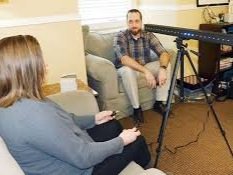
EMDR Therapy in Cedar Rapids, IA.
Online therapy all throughout the states of IA, WA, & WI.
Do you wish you could heal without talking about what happened?
Wanting fast healing?
Struggling to talk about it?
Easily triggered?
As a trauma therapist, I can support your healing through EMDR therapy to achieve fast relief without even having to talk about all the details of your experience.
Book a free consult with trauma therapist in Cedar Rapids!

Do you find it hard to talk about what happened? And are afraid that you would have to do that in therapy?
Do you feel so overwhelmed that you can’t even think about what happened without struggling?
Maybe you have already tried talk therapy but didn’t get the results you were hoping for…
As a trauma therapist, I know one of the benefits of EMDR therapy is that you don’t have to retell all the details of what happened, processing happens just from you remembering the event while engaging in “bilateral stimulation”. Fancy way of saying: activating the brain on both hemispheres.
I can help you use this treatment to your healing!
What if I told you that you are not the only one feeling like this?
In my experience working as a trauma therapist, soooo many people are afraid of sharing the details of what happened to them because it “makes it all more real”.
The good news is that you don’t have to retell your story for healing to happen.
Remember to reach out and book your 15 minute free consult to discuss ways in which EMDR therapy can help with what you may be looking for!
What to expect from Online/Virtual EMDR Therapy in Cedar Rapids
Online EMDR therapy follows the same eight-phase protocol as in-person EMDR therapy, but with some adaptations to the virtual setting.
Online EMDR therapy can be just as effective as in person as a way to address traumatic memories from the comfort of your own home including having access to your pets or emotional support animals (ESA) as well as your safe people or the foods that you enjoy.
Here you can also find more information on how EMDR therapy is adapted to online therapy.
-
Secure Video Platform: The EMDR therapist will use a HIPAA-compliant video conferencing platform to ensure privacy and confidentiality.
Stable Internet Connection: Both you and the EMDR therapist need a stable internet connection to avoid disruptions during the session.
Adequate Lighting: Good lighting is essential for the EMDR therapist to observe your eye movements and facial expressions.
Quiet Environment: Find a quiet and private space where you won't be interrupted during the EMDR therapy session.
-
Eye Movements: There are a variety of software designed specifically to facilitate virtual EMDR therapy sessions. We will discuss the one we will be using and how it will work, whether we will guide your eye movements with a light bar across the screen or we will use other methods.
Alternative Stimulation: If eye movements are not feasible, we may use alternative methods like tapping your shoulders or knees, or using auditory stimulation through headphones.
-
Check-in: The EMDR therapist will start with a brief check-in to assess your emotional state and ensure you are comfortable with the technology.
Target Memory: You will identify a target memory and focus on the associated image, negative belief, emotion, and body sensation.
Desensitization: You will recall the target memory while simultaneously engaging in bilateral stimulation. The EMDR therapist will guide you through the process, monitoring your emotional state and making adjustments as needed.
Installation: You will focus on the positive belief you identified earlier, strengthening its association with the memory.
Body Scan: You will scan your body for any residual tension or discomfort related to the memory.
Closure: The EMDR therapist will ensure you are in a stable emotional state before ending the session. They may also provide you with tools or techniques to manage any lingering distress.
Reevaluation: In subsequent sessions, you will reevaluate the target memory to ensure it has been fully processed and the positive belief has been solidified.
-
Self-Care: It continues to be a very important to practice both before and after online EMDR therapy sessions. This may include getting enough sleep, eating healthy meals, and engaging in relaxing activities.
Emotional Support: If you experience intense emotions during or after a session, it is important to have a support system in place. This may include friends, family, or a crisis hotline.
Technical Difficulties: If you experience technical difficulties during a session, communicate with your EMDR therapist. They may be able to troubleshoot the issue or reschedule the session.
If you are considering EMDR therapy, let me help you get started. Schedule a free 15 minute consultation in Cedar Rapids, with EMDR therapist, for us to talk about your needs and what you are looking for in Cedar Rapids!
Learning about EMDR Therapy:
-
EMDR therapy stands for Eye Movement Desensitization and Reprocessing therapy. It's a type of psychotherapy that can be helpful for people who have experienced trauma. It is a trauma therapy technique designed to alleviate the distress associated with traumatic memories.
It involves recalling a disturbing memory while simultaneously engaging in bilateral stimulation, most commonly in the form of eye movements guided by the EMDR therapist. This process helps the brain reprocess the traumatic memory, reducing its negative emotional impact.
-
EMDR therapy involves bringing back to certain distressing memories while simultaneously experiencing some form of bilateral stimulation to activate the brain on both hemispheres. This could include:
Eye movements: Moving your eyes back and forth while focusing on the memory.
Audio stimulation: Listening to alternating sounds in each ear.
Tactile stimulation: Tapping on alternating sides of the body.
-
The idea behind EMDR therapy is that the bilateral stimulation helps your brain process and integrate traumatic memories in a way that reduces their emotional impact. This can lead to a decrease in distressing symptoms like:
Flashbacks
Nightmares
Anxiety
Depression
-
EMDR therapy has been shown to be effective in treating conditions like:
Post-traumatic stress disorder (PTSD)
Anxiety disorders
Depression
Panic disorder
Phobias
-
EMDR therapy typically follows an eight-phase protocol:
History and Treatment Planning: The EMDR therapist will gather information about your history and the specific traumatic memories you want to address. Together, you will develop a treatment plan.
Preparation: The EMDR therapist will explain the EMDR therapy process and ensure you understand what to expect during the sessions. They will also teach you relaxation techniques to manage any emotional distress that may arise.
Assessment: You will identify a target memory, focusing on the associated image, negative belief, emotion, and body sensation. You will also identify a positive belief you would like to associate with the memory.
Desensitization: You will recall the target memory while simultaneously engaging in bilateral stimulation, typically guided eye movements. This process will be repeated until the memory becomes less disturbing.
Installation: You will focus on the positive belief you identified earlier, strengthening its association with the memory.
Body Scan: You will scan your body for any residual tension or discomfort related to the memory.
Closure: The EMDR therapist will ensure you are in a stable emotional state before ending the session. They may also provide you with tools or techniques to manage any lingering distress.
Reevaluation: In subsequent EMDR Therapy sessions, you will reevaluate the target memory to ensure it has been fully processed and the positive belief has been solidified.
EMDR therapy brings up a whole array of emotions, sensations, and thoughts. It may even cause some emotional distress, anxiety, or physical sensations. You can learn more about EMDR Therapy from EMDRIA here.
But I will be with you, every step of the way to support you and ensure you feel safe and in control.
It’s also normal to feel tired, emotionally drained, or experience some lingering emotional distress after a session of EMDR therapy in Cedar Rapids; and processing may continue even after the session is over.
So practice self-care and engage in activities that bring you comfort and relaxation.
I am a BIPOC and bicultural Trauma Therapist who serves adult trauma survivors in Cedar Rapids and through all across the states of Iowa, Washington and Wisconsin through online trauma therapy in both English and Spanish.
-
I know that shopping for a trauma therapist isn’t an easy process. I like to think about it as finding the right pair of jeans, so if you are inclined to think that we may be a good fit, I’m more than happy to have a conversation with you and answer some of your questions before booking an appointment.
-
Free
-
If you’re ready to set up an initial consultation and start working with me. Typically, this session is a little more formal since we will go over your history and background as well as policies related to our therapeutic relationship.
-
It’s a one time $200 fee
-
These sessions are reserved for those who have already completed an initial consultation and have established care within the last 6 months.
-
$130 per session









